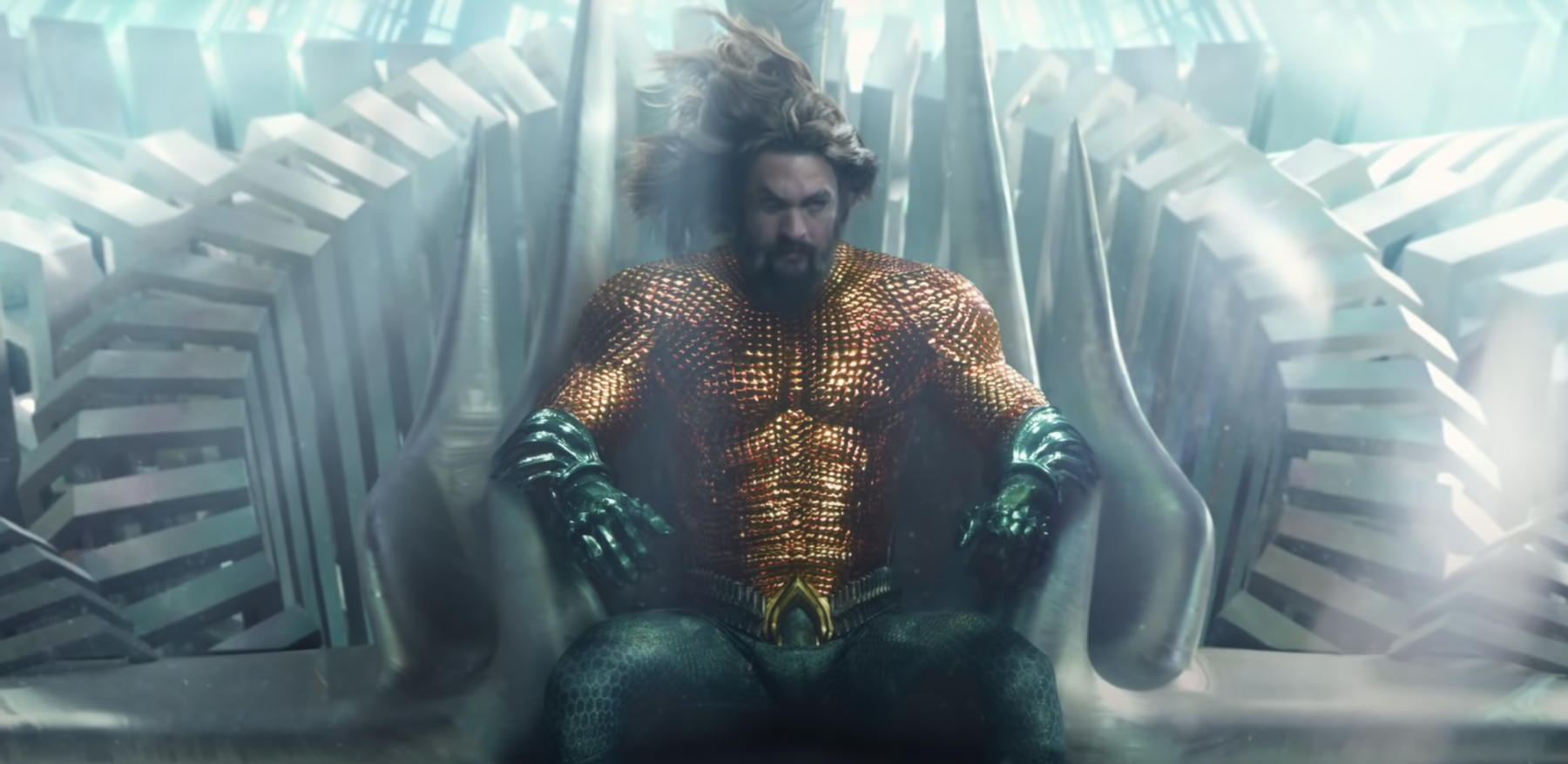It’s fitting that “Aquaman and the Lost Kingdom” is about a dying world that can’t be bothered to save itself, as this goofy but half-hearted sequel — a damp shadow of James Wan’s deliriously fun 2018 original, which grossed more than a billion dollars at the height of the superhero boom — is the orphaned child of a cinematic universe that was abandoned at sea while this movie was still in the womb. Greenlit at a time when it seemed like Jason Momoa’s Atlantean surf-himbo might be light enough to buoy the rest of the DCEU, “Lost Kingdom” is being released in theaters as the product of a conglomerate that didn’t exist when production began, and under the banner of a newly formed studio that didn’t have any use for it by the time production ended. For DC Films, Aquaman was the future; for James Gunn and Peter Safran’s DC Studios, Aquaman has no future.
The good news is that “Lost Kingdom” was designed to be — or at least convincingly became — a self-sustained adventure that didn’t have to rely on any of the cameos and crossover events that have all been left on the cutting room floor. The bad news is that the macro-narrative purposelessness of this movie’s production seems to have seeped into the water at some point along the way, as this floundering sequel lacks the sense of discovery and depth of vision that made the previous “Aquaman” so much fun (especially in comparison to the rest of its self-serious franchise). Where that film swam to the beat of its own octopus drummer, this one basically just plays scales. “Sometimes, just showing up is the most heroic thing you can do,” Aquaman’s father tells him. This is not one of those times.
That nugget of wisdom sounds ridiculous at the start of a movie that will obviously end with its half-Atlantean hero saving the entire planet from CGI, but it’s offered in the context of parenthood, where it more broadly applies. Yes, Aquaman, AKA Arthur Curry, is now an Aquadaddy (I’m guessing it was a water birth), as screenwriter David Leslie Johnson-McGoldrick decided that giving the character a child was easier than giving his wife Mera (Amber Heard) a character. Or, for that matter, giving the child a name.
When Arthur isn’t bored out of his mind in the Atlantean senate, he’s being peed on — directly in the face — by the heir to his throne. Yes, the last film in the DCEU bloodline is also a story about the continuation of a DCEU hero’s bloodline, and thank goodness for that, because such meta-textual ironies are pretty much the only thing to hold onto here. Anyway, let’s just hope that Arthur’s nemesis, Black Manta (AKA David Kane, with Yahya Abdul-Mateen II reprising his role) doesn’t find out that Aquaman has a squishy new vulnerability that he can exploit.
As things stand, Manta is too busy trying to find his way back to Atlantis to wonder about what’s happening topside. His tireless quest is unexpectedly turbo-charged when his nerdiest underling (Randall Park returning as Dr. Stephen Shin) discovers a giant ice palace of some kind under the snows of Antarctica. Guarded by a mean and many-tentacled sea creature who’s revealed in a creepy, horror-accented sequence that epitomizes the heightened energy Wan is able to bring to these movies (even if it seems like the prelude to a second encounter that never comes), the giant ice palace happens to be home to the Black Trident, a cursed object that possesses Manta with the spirit of an ancient Atlantean ruler who probably wants to live again or whatever.
The why of it all doesn’t matter to this story nearly as much as the how, because freeing the king of Necrus from his frozen Necrupolis requires Manta to hoard a volatile resource called “orca cum” — or something like that — and use it to hasten global warming. If Arthur has any hope of saving the world from environmental disaster and a “Lord of the Rings”-like army of undead green wraiths (the “Return of the King” energy is off the charts during the third act of this movie), he’ll have to team up with the treacherous half-brother he defeated in the previous installment, uniting land and sea around a common purpose after centuries of one-sided exploitation.
Enter: Everyone’s favorite Orm, Orm Marius (a loose and amusing Patrick Wilson), a two-faced pariah who’s essentially just a low-key Loki look-alike who’s never had a minute’s worth of fun in his entire life. Lest anyone fail to make that direct connection, Arthur even refers to his estranged sibling as Loki at one point, though presumably he’s talking about the Norse god and not the Disney+ hostage. “The Lost Kingdom” is at its most enjoyable whenever it eschews the whole “saving the planet” thing in favor of being a simple buddy comedy about two mistrusting siblings from very different worlds.
It feels like a perverse mistake that the majority of their adventures take place on land (especially in a movie that only knows how to separate itself from the usual superhero mishegoss when it goes underwater), but watching these two race around a dime-store version of Skull Island is almost worth it just to see how Orm thinks running is supposed to work. Momoa is never quite as checked out in the film as he has been on the film’s press tour, but he’s definitely energized by having a real character to play against instead of a sea full of digital fish.
Which isn’t to suggest that the special effects work is subpar. It’s true that “The Lost Kingdom” sorely lacks the detail and vibrancy that made the oceanic realms in the previous installment so eye-popping and full of life, but we’ve upgraded/downgraded from a rock octopus to a mer-creature pop band, and there’s a shot where what appears to be a fully CGI Nicole Kidman grapples onto a passing sea creature at top speed.
But even that momentary flash of “what the fuck am I watching?” seems like a faint echo of the epic silliness that Wan brought to the original, and not even a welcome reappearance from John Rhys-Davies’ Brine King is enough to put the genie back in the bottle. Hearing Gimli’s disembodied voice does add to the Jacksonian flourish of the final act, in which what little is left of Manta’s dramatic stakes are sacrificed at the foot of a partially submerged Mordor, but by that point the fun of the action is as empty and manufactured as that of Arthur’s narration (“They say everybody’s good at something. Me? I talk to fish”).
Where the previous “Aquaman” was psychedelically high on its own supply and so eager to top itself that it eventually led to Jason Momoa talking to a mythical sea monster who sounded a lot like Julie Andrews, “The Lost Kingdom” becomes more and more formulaic as it digs into its mythos, as if the movie were caught between being its own thing and being nothing at all. If only Wan and co. had seen the writing on the wall a little earlier, perhaps they could have found a way to ensure that the DCEU went down in a blaze of glory. Instead, it just sinks to the bottom of the sea, with Aquaman pushing to bring his world to the surface at the same time as Warner Bros. Discovery consigns his entire universe to the ocean floor.
Grade: C-
Warner Bros. will release “Aquaman and the Lost Kingdom” in theaters on Friday, December 22.



